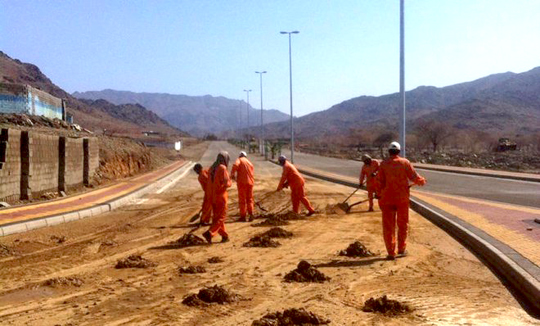Jeddah, Oct 5: An obnoxious and very unpleasant discussion on Twitter about the role of expatriates in Saudi society has elicited hundreds and thousands of reactions.

The hashtag — offensively titled “Deportation of Foreigners Is a National Request” — has riled and angered many members of Saudi society.
Because of the huge response, the hashtag trended throughout the day on Tuesday.
As is often the case, many of those who responded felt that the racist hashtag was a creation of those who are conspiring to give a bad name to Saudi society.
Among them was TV producer Mohammed Al-Jubna.
“This campaign does not, and cannot, represent the Saudi people,” he said. “It simply creates bad feelings between Saudis and our brothers and friends from Arab, Muslim and non-Muslim countries.”
Businessman Faisal Al-Atawi went a step further in his view of expatriates.
“They are our brothers, especially the Arabs and Muslims. We cannot say that all expatriates are bad as many of them have contributed to the development of the Kingdom’s infrastructure and economy.”
Al-Atawi pointed out that expatriates have, by their sheer efforts at work, risen to top positions in different corporations and companies.
“They do not just work as chief executives but also as street-cleaners; and they all contribute to the country’s progress,” he said.
He said some tasks simply could not be done without expats “because of the low wages some of the jobs pay.”
Saad Al-Maliki, a Saudi citizen, pointed out an interesting aspect.
“These social media outlets provide anonymity to bigoted individuals,” he said. “Those people use anonymous IDs to spew venom against different sections of society.”
This idea was supported by General Intelligence Director Gen. Abdul Aziz Al-Howiriny, who cautioned Saudis and expats about false IDs on different social media apps.
“Their prime objective of these faceless troublemakers is to target the security and stability of the Kingdom,” he said.
Praising the role of expats, Saudi citizen Raid Al-Otaibi said: “They left their hearth and home to make a decent living for their families. Instead of asking for their deportation, we should welcome them to their second homeland.”
Nasr Al-Omar, a cleric, shared a video on Twitter on which he stated: “I say to those who claim that expats are taking their money and jobs that they have been contributing to the success of many companies for generations and if they leave, many of the companies will go bankrupt.”
Al-Omar reiterated that expats had been brought here by Saudis in order to serve the country’s best interests.
“Some of them work for very low salaries, for wages that few Saudis would accept. They are our brothers and our partners in progress. Many of them have educated us and our fellow citizens. The least we can do is to thank them.”
Another citizen Mohammed Al-Shehri questioned the origin of the divisive hashtag.
“It is the work of those who want to spread hate and sedition between Saudis and foreign workers,” he said, and called on the authorities to investigate those who are guilty and take action against them.
“Expats have been part of our society for many, many years and they have been loyal to our country. They should be treated with respect and dignity,” said Al-Shehri.
“Thousands of Saudis travel abroad every year. How would they feel if someone told them they were not welcome and slammed the door in their faces?” asked one respondent to the hashtag.





Comments
Add new comment